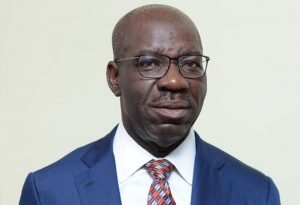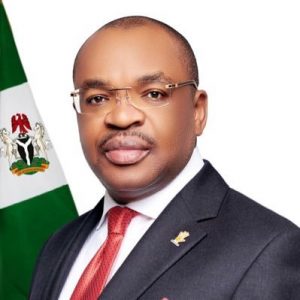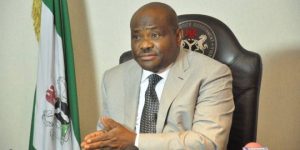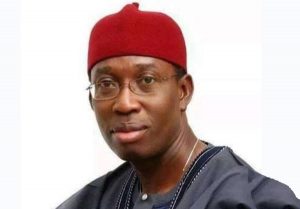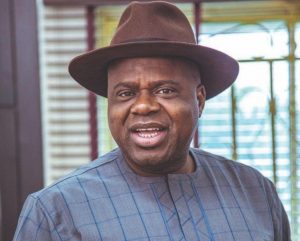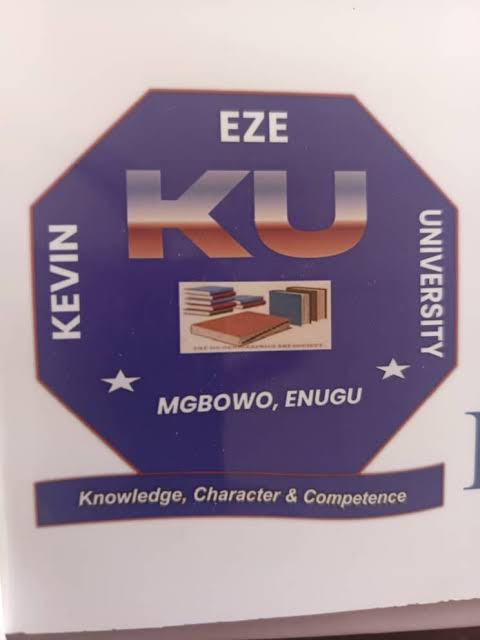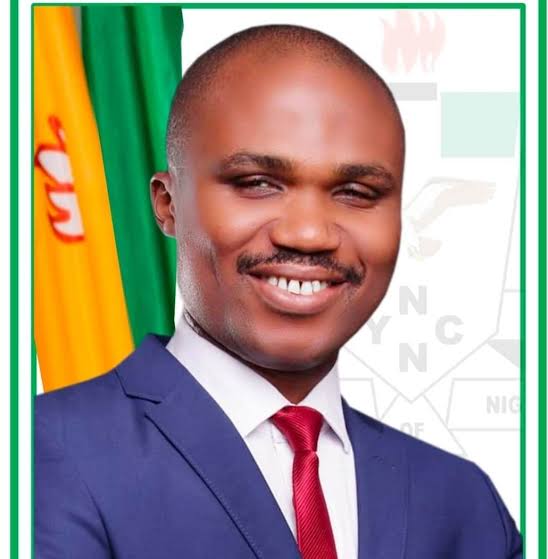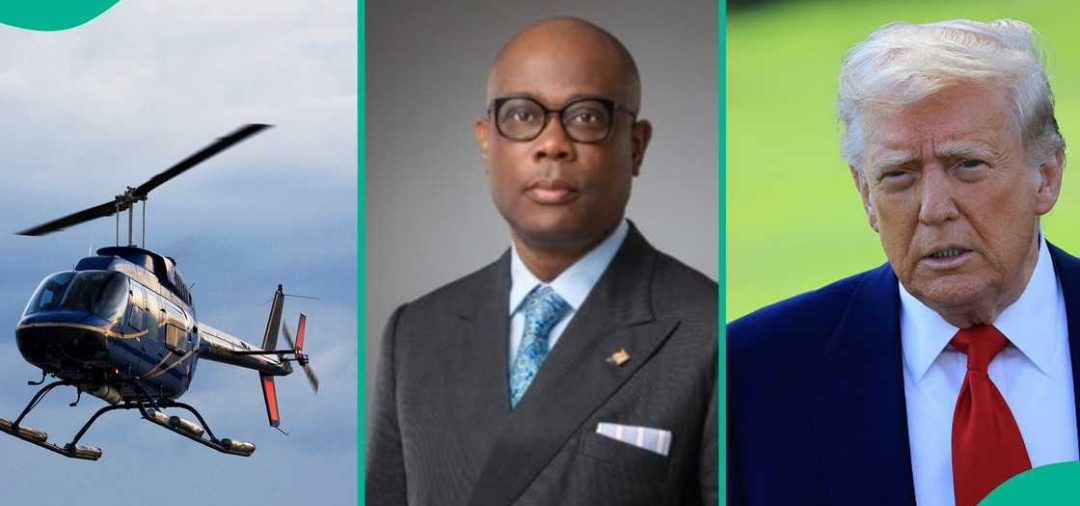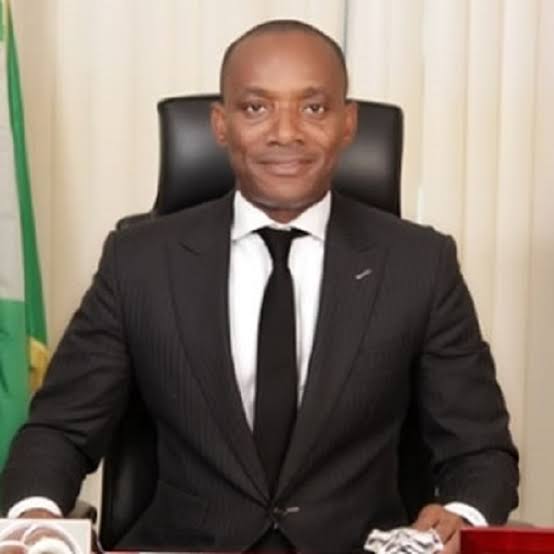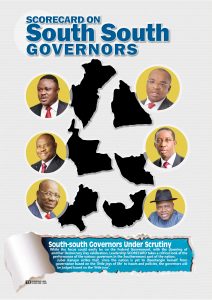 …the Nigerian South-South Governors Under Scrutiny
…the Nigerian South-South Governors Under Scrutiny
While the focus could easily be on the Federal Government, with the dawning of another Democracy Day celebration, Leadership SCORECARD takes a critical look at the performance of the various governors in the Southernmost part of the nation.
Jubal Kanayo writes that, since the nation is yet to disentangle herself from governance based on the ‘little joys of life’ to issues and policies, the governors will be judged based on the ‘little joys’.
Cross River’s Ben Ayade
A Professor of the sciences, Ben Ayade swept into office on the back of some very colourful campaigning and, true to his nature, has not desisted from bringing some fresh air to the table, thanks to his quotes over the last couple of months, in the face of the novel Coronavirus pandemic.
From his bright, enviable facial masks, to his bubbly nature and fantastic claims about infrastructure put in place, as well as huge disbursements to the health sector and, of course, the Calabar Carnival, Ayade has been in the news.
In 2019, he was the Leadership Newspapers Group Governor of the Year and the Champion Newspapers’ Governor of the Year, in 2018 he was the BusinessDay Newspaper’s Governor of the Year for his strides in agriculture and in 2016 he recognized as the Vanguard Governor of the Year.
Ayade and Liyel Imoke, the man before him, pale in comparison to their predecessor, Donald Duke – it is always unfair to look at any of the governors after Duke from his track-record and performance – but, in Ayade’s favour, he has ignited an industrial revolution that has put the state on the pedestal of sustainable economic growth, for building factories with zonal spread across the state, providing job opportunities for youths and women, rebuilding the state’s decrepit infrastructure, as well as empowering his people economically with his agricultural transformation agenda.
Those on his side of the wall say he has never taken any decision without aims and objectives since he assumed office on May 29, 2015. His sassy deployment of scientific and technological terms in christening his annual appropriation bills has caught the eyes, too. For 2018, it was ‘Budget of Kinetic Crystalisation’; in 2019, it crystalised into a ‘Budget of Qabalistic Densification’ and, most recently, the 2020 budget metamorphosed into something more concrete, ‘Budget of Olimpotic Meristemasis’.
As part of his industrialisation drive, the governor ‘touched’ up the marshy 5000 square-metre area somewhere along the Jonathan By-pass in Calabar and in the wake of that ‘touch’ followed the Garment Factory which has employed 3000 youths and widows. While many thought of this as a total waste, the coming of the Coronavirus has ensured that the sprawling factory got a second look, as most of the free face masks distributed in the state were produced in the factory. It could not have chosen a better time to be a plus.
With the success of the completion of the factory, a huge boost followed. The Chief of the Air Staff, Air Marshal Sadique Abubakar, paid a courtesy call on the governor, visited the place and was won over. The result: the Nigerian Air Force announced a partnership with the state government to the produce uniforms for its personnel. This was in line with President Buhari’s directive to the Nigerian Armed Forces to lay more emphasis on local content and was ticked off as a win for the flambouyantly dressed governor.
Africa’s first ever vitaminised automated rice seeds and seedlings factory at the Calabar Industrial Park followed. Here, improved rice seedlings are raised for rice farmers across the three senatorial districts of the state. With the rice seedlings factory in Calabar and a world-class automated rice mill in Ogoja to complement it, the Ayade rice revolution resonates beyond the shores of the state. The state projected that this venture would generate N70 billion annually and, upon completion, the Federal Government through the Central Bank of Nigeria (CBN) and the Rice Farmers Association of Nigeria (RIFAN) placed a N3 billion order for the state to supply rice seedlings to all the states in the southern part of the country.
Clearly, a visit to the Ogoja mill shows that it is 75 per cent complete, with virtually all the equipment installed. It does hold a lot of promise, even though most in the state are almost done waiting for it to come afloat.
Also, the ultra-modern automated cocoa processing plant at Ikom is yet to be completed, with an installed capacity of over 50,000 tonnes. The plant is wired to process cocoa beans into chocolate bars. Over 5million cocoa seedlings have already been raced to ensure that the plant does not lack produce. The plant is designed to generate $100million annually for the state, LEADERSHIP Scorecard understands.
Governor Ayade initiated a poultry and livestock policy in line with his commitment to broadening the frontiers of state’s economy, leading to the establishment of the Cross River poultry farm and livestock limited and Calachika Chicken Processing Plant, with installation of equipment at 80 per cent completion stage. When the poultry farm/live Stock facility, which is primed to have six broiler houses each with 22,000 birds, becomes operational, it would clearly and firmly establish Nigeria ahead of Ghana, Ethiopia and Tazania who are the giants of poultry production in Africa.
Still located within the Calabar Industrial Park, the multi-billion Naira chicken processing plant will depend on the poultry farm to feed it with birds when completed. The plant’s target is to process 6,000 frozen chickens daily, both for local consumption and export.
Nigeria is notorious for her importation of toothpicks (yes, you read that right). Baffled by this, Ayade’s administration has been lauded for the establishment of a toothpick-producing factory in Ekori, Yakurr local government area of the state. Besides the technological aspect, the establishment of the factory is to spur the people in the locale to go into bamboo farming can take advantage of the presence of the raw material in their domain.
In a bid to beat his critics into silence, Ayade, so set upon the path of economic emancipation, embarked on the construction of the Bakassi deep-sea port and the 276-kilometre, six-lane, super-highway. If none of the other projects were considered ambitious, these two were and still are and the fact that they have not reached 40 per cent completion has given the governor’s critics fodder for their fire.
One of his first huge steps was the Calabar 23 megawatts power plant which came to be in 2016 (even though its impact is scarcely felt these days). However, one of Donald Duke’s realistic attempt at putting the state on the map, Tinapa is still waiting for the construction of the 26 Megawatts gas-fired power plant to be completed.
For some reason, paying salaries has become an achievement which Nigerian governors take pride in (perhaps, because of the culture of deliberately owing civil servants) and, since they discovered that it is something to boast of, for some reason, many of them have made it a part of their ‘achievements’ list. While his ability to pay salaries or not is not the issue here, Ayade has got the State House of Assembly to exempt state workers earning below N30,000 a month as well as the exemption of levies for artisans, petty traders operating in the state.
Inspite of all the razzmatazz and the klieglights the governor has enjoyed, his critics have refused to grow weary. He is known, not fondly, as the one who is “driving Cross River State into the Atlantic”.
According to a social critic, Elias Ozikpu, Ayade has made more messes than he can clean up, more out of ignorance than a deliberate desire to misgovern.
“The total debt of Cross River State as at the end of 2017 was approximately N177.16bn, with external debt growing to $167.9mn in 2017.In the whole of 2017 Cross River was only able to generate revenue of N41.6 billion, with its internally generated revenue accounting for 34.58% – N18.10 billion.”
“Knowing this, he went on to pass a budget of N1.043 trillion for the 2019 fiscal year without clearly stating how to fund it. The governor and his people mortgaged the future of our people and several generations yet unborn for 180 years – approximately two centuries – in exchange for N648,870,730,739.23, funds purportedly meant for the proposed ‘super-highway’.
“Have you seen the government schools in the state? Got to Boki interior and you’ll now that the governor is doing some serious window-dressing. What do the impoverished children who go to school in Boki and Etung want to do with factories in a state that has no provision for power supply? The people of Cross River want a decent life, with reliable medical facilities, well-equipped schools, good water (most of the people presently journey to distant streams for water, because the state has no organised water grid system), good roads to go about their businesses, etc.,” he said.
For Bassey Ekpo, another critic of the governor, his time at the state house has been a “complete waste”.
He told Leadership SCORECARD: “Imagine how long these projects have taken and other meaningful things the governor could have done at the time. See, for these men, governance is a means to an end and it does not factor in the people. Is planning to go to the Senate already but he has done nothing as governor, except stall and stall. Look at the Ogoja-Ikom-Calabar Road. All he has done year after year is pour gravel and let the rains eat it away.
“Since 2016, the rice mill in Ogoja, the cocoa whatever in Ikom, the ones at the Industrial Park in Calabar and, the deep-port thing in Bakassi and many others have just been lying there, like corpses, moving at deliberate snail-speed.
“It is such a poor cycle; he has neglected health (right now, the state has no testing centre for Coronavirus, but clams it has not recorded any case), education (the teachers are not paid), housing for civil servants and he is quite unconcerned about the local economy (Calabar is all the state has, every other place is lying fallow and Ikom is the only one fending for itself for a number of reasons, ranging from smuggling, prostitution, petty crimes, cocoa economy farming etc) and how to boost it; he is more into high-sounding words and other less-meaningless ventures.
“How can one man have a shot at history and blow it away? Let us look at this critically; governance in Nigeria is still a scam and, until we call people like Ayade to order, it will be a while before we get it right,” Ekpo said.
Edo’s Godwin Obaseki
The Edo State governor, Godwin Obaseki, is one man who has been beset by political upheavals, primarily due to the no-love-lost relationship between the Peoples Democratic Party (PDP) and the All Progressives Congress (APC) in the state.
Be that as it may, Obaseki has not been resting on his oars.
The spate of development, rapid industrial expansion and boom in economic activities across the 18 local government areas (LGAs) of Edo State, distinctly marks Obaseki out as one of the conscientious performers in politics to serve.
Upon resumption in 2016, the governor marked off six thematic pillars through which he is driving reforms across the state, vis; basic education, primary health care, sports development, urban renewal, security, job creation and industrialisation, among others.
The pre-2016 Edo State was characterised by thuggery, armed robbery, hooliganism, and brigandage, where various non-state actors seemed to have annexed different segments of the state to themselves. This climate of fear and terror was an immediate variable of disinclination for investors.
From the first day in office, Governor Obaseki identified the need for efficient and functional bureaucracy as the fulcrum upon which development in the state would revolve.
The governor commenced the civil service reform by ensuring that those who work hard for the growth and development of the state were assured financial security by way of ensuring that their monthly salaries and other emoluments are paid promptly.
The Godwin Obaseki-led government embarked on massive construction of new offices and secretariats for the workers, including the completion of the Blocks C and D in the Secretariat Complex with the Treasury Building, which was abandoned for over 40 years.
While Obaseki may not have much going for him in infrastructure, he has almost made up for that with sound policies, one of which has seen more women break into the male-dominated world of permanent secretaries.
His administration has ensured the up-skill and capacity development of over 11,300 teachers and equipped them with cutting-edge technology to improve learning outcomes in classrooms. Consequently, the United Nations Children Fund (UNICEF) has rated the state as the one with the least number of out-of-school children.
So far, the state government has rebuilt over 250 schools and deployed bespoke technology in the classrooms. The net result is that over 300,000 children in public schools not only just go to school but now learn when in school.
After successive governments left the Samuel Ogbemudia Stadium to rot, Obaseki’s administration has ensured a complete rebuild. This move saw the Federal Government hand the rights for hosting the 2020 National Sports Festival to the state. Many can now look at the edifice, named after one of the state’s illustrious sons, with pride.
Following the success of the 2019 Agriprenuer programme in the state, the administration, through the Central Bank of Nigeria (CBN)’s Anchor-Borrower programme, sealed a deal with the Nigerian Incentive-based Risk Sharing System for Agricultural Lending (NIRSAL) for the initiative’s expansion to cover tuber and root farming, poultry and piggery. Also, in December 2019, the CBN invested the sum of N69billion in the Edo State Oil Palm Programme (ESOPP) for small-holder farmers.
Obaseki’s urban renewal drive has continually expanded in the last three years, via road projects spread over the 192 wards in the 18 LGAs of the state. So far, the state government has built over 800 roads, which stretch for about 2,000km. While the State’s Ministry of Infrastructure constructed about 300 roads, which stretch for 700km, the state under the various streams of the Edo State Employment and Expenditure for Result (SEEFOR), constructed over 500 roads, spanning about 1,300km across the state.
In housing, the state government has not performed terribly.
The Emotan Gardens is an 1800-unit affordable housing estate developed by the state government through the Edo Development and Property Agency (EDPA) and Mixta Africa, a renowned property developer. The estate sits on a 70-hectare in Upper Sokponba axis of Benin City and provides a range of housing options to subscribers.
Even though health has become something no governor or, even, the Federal government should overlook, the current Coronavirus pandemic has shown up African – and, by extension, Nigerian – leaders for who they are.
That said, the current administration in the state has seen to the construction and reconstruction of 20 Primary Health Care centres across the 18 LGAs of the state, as part of the Edo Healthcare Improvement Programme (Edo-HIP). The health centers are equipped with adequate security, utilities, 24-hour electricity (using solar energy), provided with essential drugs and medical appliances as well as a complement of Information technology gadgets for tele-medicine (the last is just a claim, it is unconfirmed).
A Lassa Fever Isolation center at the Stella Obasanjo Hospital, Benin City, has been completed, while another of such facility is being built at the Auchi General Hospital. The Edo Specialist Hospital has been opened to the public and is offering bespoke services.
Towards the end of 2019, Obaseki’s administration launched the Edo State Social Health Insurance/Basic Health Care Provision Fund (BHCPF), making an initial contribution of N100m to access the BHCPF and open up opportunities to energise its health insurance programme.
In the wake of the coronavirus pandemic, the state has acquired a 280-bed isolation capacity, 28 ventilators and 10 Intensive care units (ICUs at the Stella Obasanjo Hospital Benin, University of Benin Teaching Hospital, Irrua Specialist Hospital and the Auchi General Hospital, while setting up 100 screening centres across the state to contain the spread of the virus.
Akwa Ibom’s Emmanuel Udom
Inspite of his many critics and the fact they think he is such a green horn who moved in to fill the shoes of his larger-than-life predecessor, Governor Emmanuel Udom’s recognition by the World Bank as the best performing governor in the South-south, due to his commitment to execution of developmental projects is a talking point.
Ibom Air is, obviously, not the only achievement the state government has recorded. Udom has wholly dedicated himself and his administration’s effort to primary healthcare delivery and agriculture (mostly) and the state is not doing badly for it.
One of the ground-breaking achievements of his administration is the establishment of a toothpick and pencil factory, the first of its kind in Nigeria. With this, the Emmanuel administration has put an end to importation of these basic products into Akwa Ibom and other states in the country. No doubt, the state will begin to generate revenue from this factory by selling the products to other states of the federation in addition to creating jobs and reducing poverty. Located at Itam Industrial Park in Itu, where a Plastic Manufacturing Plant is also established, the factory has the capacity to generate N1 billion annually, in addition to creating about 10, 000 jobs for the people of Akwa Ibom. The money generated by this factory will boost the internally generated revenue (IGR) of the state, under the Akwa Ibom Employment and Enterprise Scheme (AKEES).
On the occasion of the 30th anniversary of the creation of the state, the governor inaugurated a multi-million Naira syringe manufacturing factory in Onna Local Government Area and is owned by a Turkish firm known as VKS Group. The factory has the capacity to produce 350 million units of 2ml, 5ml and 10ml disposable syringes annually. Although the industry is a private sector investment, the government of Akwa Ibom provided land and other enabling factors to attract the foreign investors from Turkey.
Similarly, an Electric Metering factory has come on stream in Onna, with the capacity to produce about one million units of electric meters annually, boosting the nation’s ailing power sector where electricity supply and metering have been major hindrances to industrialisation. Within the first year of its operation, the Port Harcourt Electricity Distribution Company, PHED, procured about 40, 000 digital meters for installation on residential and official properties within Uyo and its environs.
In order to rejuvenate Peacock Paints Industry located at Ikot Ekan in Etinan Local Government Area, the state government spent about N526million. While re-inaugurating the company, the governor announced that the state had also paid off the company’s debt, arising from interests on a N30million loan from financial institutions. The government also entered into discussion with German investors to ensure effective management of the company and production of quality products while guaranteeing jobs.
The Ibom Power Plant is up and running, supplying up to 20 hours of electricity to homes and commercial outfits and, in the process, enable small and medium-scale (SMEs) industries to thrive. This has also encouraged investment in Uyo and Ikot Abasi, among others.
Also, the Coconut Oil Factory in Mkpat Enin Local Government Area, established within the first three years of his administration, now has the capacity to generate about 1, 500 direct jobs, contribute about $200 million to the state IGR. To ensure the smooth running of this factory and boost availability of raw materials for the refinery, the state government ear-marked 11, 000 hectares of coconut plantation where 2,000 stands of coconut trees have been planted. Interestingly, this will generate employment for 2, 000 to 3, 000 people.
In 2019, Vice President Osinbajo (SAN), in the company of the governor, launched the King’s Flour Mill in Okat, with a capacity to process 500 metric tons of wheat daily.
The one achievement Udom has inched, which has made Akwa Ibom the envy of many (arguably) is the obtaining of licences to operate the first state-owned Ibom Airlines, which has since commenced operations and, at the last count, has four aircrafts in its fleet.
Also in the works is the Ibom Plywood Manufacturing Company and the Ibom Deep Seaport for which the state government is awaiting the preferred bidder, Bolore China Construction Ltd, to finish construction.
As he bids for a second term in office, Udom is pushing for the state to move from one which depends on the government through the civil service, to one which generates wealth and supports itself from within, via a thriving local economy.
Of course, he has his critics and, while most of the projects are still ongoing, he can be counted on to complete them. Afterall, the state governors have a track record of completing and presenting great projects.
Rivers’ Nyesom Wike
It is easy to brand him the governor who loves picking a fight but, hell, every state gets a governor who can deal with what he is offered and Wike did not come ill-prepared. He may not have hit the apogee as far as achievements and milestones are concerned, but it does not mean that he has not scared away the frightening shadows which accompanied the state wherever she went or her name was mentioned.
One thing can be said for Wike. He is not a huge fan of governing by cronism.
As Minister of State for Education, he did not cower from a fight or project and when the time came to take the reins as the Minister of Education, he did so gallantly. He left no stone unturned.
Within his first 100 days in office as governor, he completed and furnished the faculty of Law of the Rivers State university which had been abandoned by successive government since the 1990s; established a Medical school in the Rivers State University, which had been without medical school since the university was established in 1980; complete renovation and remodeling of GGSS Rumuokwuta, GSS Ogu, BMGS Bori, MGS Abonnema, Govt. Craft center, PH, Country High School, Ohoada, GSS Abua, GSS Ubima and GSS Okaki; Renovation and refurbishing of junior secondary schools in the states under the State Universal Basic Education Board (SUBEB); sponsoring free JAMB 2019/2020 registration for candidates who are natives of Rivers State and free WASSCE 2020 registration for all candidates in public schools in the state; basic one-month capacity training for teachers across the 23 LGAs in the state in August 2019 and ensuring that the state maintains great standing in the WAEC ranking of the 36 states of the Federation.
Wike started off with ‘Operation Zero Porthole’, which saw him fill all potholes and repair short patches of roads in all parts of Port Harcourt.
The Nkpogu road and bridge has been completed and it links LNG and Trans Amadi. Gov Wike also linked Trans-Amadi to Trans-Woji area that takes it to Akpajo and Eleme Road by completing and opening the Woji Bridge. He also completed the road that extends from Peter Odili Road through the housing estate that hopes to link RSTV Road in Elelenwo and down to Akpajo and East West Road. The exit through Elekahia road was also constructed and traffic from Trans-Amadi now flows freely to other parts of the city and out to other parts of the state. This is very important and very strategic to investors because of the need to move heavy items in and out of their business base.
Those who would want to visit Trans-Amadi today would know that Gov Wike has cured 90 per cent of problems of the business community in that area. What it implies is that the traffic problems in the area, the inconveniences suffered by trucks and lorries, the security problems that made banks unsafe, the reluctance of security agencies to patrol Trans-Amadi, and all of those factors that drove away a lot of businesses from their places have been removed. Today, businesses are returning.
One of the first things the governor did in the journey to bring the sector where it is today was to commence the renovation of 13 General Hospitals – General Hospital Abua (completed and commissioned), General Hospital Nchia; General Hospital Bodo, General Hospital Ngo, General Hospitals in Opobo Town, Buguma, Abonnema, Emohua, Isiokpo, Omoku, as well as the Cottage Hospital Eberi – spread across the State. Renovation works were also carried out at the Neuropsychiatric Hospital in Obio/Akpor. Most of these renovation works have either been completed, or over 90 percent completed.
Wike’s also boosting businesses via the bottom-up approach, by strengthening the purchasing power of the lower segment of the society by creating several loan packages to different groups. There is the N200m per month revolving loan to civil servants, N200 million monthly interest free loan to businessmen and young entrepreneurs, N500 million to boost private healthcare participation, N500 million grant to market women groups, and other packages to other groups. The state government began in this direction by working hard to draw down the CBN N2 billion SME loan, which Rivers State obtained through RIMA and disbursed to about 35,000 micro, small and medium-scale (MSMBs) businesses, in a bid to boost economic activities at the bottom level and make them economically active and boost purchasing power to engage the medium level entrepreneurs that produce fast-moving goods and services.
Tax reforms are another area where the governor is working hard. Tax holidays have been created to boost virgin investors. Rivtamis is now online, multiple taxation is over, tax papers are processed with minimum delay. There is constant intervention in problems of businesses. Now, business groups are happier. There is the tax appeal tribunal, which addresses grievances on issues of revenues and levies.
When Wike assumed office, he started the completion of several roads abandoned by the immediate past administration and, soon enough, over he had engineered the rehabilitation of over 120 kilometres of roads in seven local government areas; Port Harcourt, Obio/Akpor, Ikwerre, Eleme, Etche, Oyigbo, and Akuku-Toru local government areas.
Some of the prominent roads are Abonnema/Obonnema Link Road/Bridge (commissioned), Eagle Island/Iloabuchi Road/Bridge (commissioned), Abuluoma-Woji Link Road/Bridge (commissioned), Oyigbo Market Road (commissioned), and Nkpogu-NLNG Road/Bridge (commissioned), re-construction of 33 kilometres of township roads under Operation Zero Potholes (handled by Julius Berger and CCECC), re-construction of Igwuruta-Chokocho Road, re-construction of Eleme Junction to Onne Junction of the East-West Road, re-construction of the Rumualogu/Alakahiah Road, rehabilitation of the road under Mile 1 Bridge, re-construction of the Rumuolumini-Iwofe Road, rehabilitation of Obi Wali Road, re-construction of Eliop Road, amongst others.
Wike had done a lot. Although his critics may accuse him of high-handedness and ruggedness, Rivers State could not have asked for a better governor to entangle her from the cobwebs of individual interests, mad-house urbanization and near-anarchy.
Wike is far from perfect and he has been accused of discarding finesse to dig into the dirt and hunt for the ones who would not let the state sleep but, at least, the people of the state can have some peace and quiet from cult wars, kidnappings and all other forms of alarming crimes which have threatened to engulf the Garden City.
Delta’s Ifeanyi Okowa
Dr. Ifeanyi Okowa has been on the saddle since 2015. It is no surprise that a lot is expected of him.
Soft-spoken and more of a paced-worker, he will not count time as one of his enemies if Deltans do not remember him fondly. He had eight years.
Okowa came to town with a five points to consider, vis; strategic wealth creation projects and provision of jobs for all Deltans, meaningful peace-building platforms aimed at political and social harmony, agricultural reforms and accelerated industrialization, relevant health and education policies and, lastly, transformed environment through urban renewal.
Job creation which was delivered to Deltans through the establishment of the Delta State Job Creation Office is indisputably one of the major achievements of the Okowa-led government in the last couple of years.
Consequent upon the initiatives of the Job Creation Office, thousands of Delta youths have not only been gainfully employed, but have gone ahead to become employers of labour. Thousands of youths across the three senatorial districts have been trained to acquire skills in various trades and vocations, and empowered with starter packs in the last four years. Many of them today have become employers of labour. That initiative has recorded more than 85% success in strategically creating wealth through the provision of these jobs.
Okowa is an amazing team player who knows how to broker peace and settle disputes. The few uprisings that were heard of at different locations within the State were quickly dealt with. For instance, the Ogbe Ijaw/Aladja boundary dispute which was becoming quite challenging was eventually resolved. It can safely be asserted that Okowa’s peace-building initiative is clearly responsible for the social, political and economic harmony which the state is enjoying today.
The PPSP (Production and Processing Support Programme) is another pace-setting agricultural support programme of the Okowa-led government. Through the programme, the state government has given massive support to farmers in the state, by giving out loans, farm machineries, expert support and training. Fish farmers across the state have received support, ranging from provision of fish fingerlings, feeds and expert training, amongst other forms of assistance.
The governor extended his hand to the Small, Medium Enterprise sector, where the Delta State Micro, Small & Medium Development Agency (DMSMDA) has provided loans and technical support to small businesses. The governor has left no stone unturned in giving a new lease of life to the various sectors of prosperity in Delta State.
Okowa has not overlooked the health sector. His administration has committed enormous resources to ensure that Deltans have access to basic health care, by making available N1billion to boost the State Contributory Health Insurance Scheme, in furtherance of his promise to provide affordable and qualitative healthcare services. The scheme which took effect in 2016 now has over 200,000 enrollees.
Over 65 secondary healthcare centres are fully operational to facilitate the successful implementation of the scheme and, in addition, over 100 primary healthcare centres have also been inculcated into the scheme which also provides free maternal and free under-five healthcare programmes (originally initiated by the previous administration).
In roads’ construction, Delta State has experienced an unprecedented transformation, with over 317 road projects spanning over 2,000km and 344 km of drains valued at over N243bn. Out of these, 135 projects have been completed covering 405km of roads and 159 km of drainage. And all these are aside the rehabilitation of existing but dilapidated roads.
Chief among these roads are the main Axial Road and Okerenkoko Township Roads in Warri South West local government area. There is also the asphalt overlay of the 19.5 km Obutobu1-Obutobu11-Sokebolou-Yokori Road also in Warri South West local government area, 10.8km Okpere-Umolo-Ovwodokpor-Kiagbodo Road in Ughelli South and Burutu local government areas, Jeddo-Ughaton Road in Okpe local government area and the access road to Eagle Heights University, the Oteri township road in Ughelli North and Okpe Olomo/Otor-Orere Olumo Road in Ughelli South. There are also the expansion and rehabilitation of sections of Oghara Junction to Otafe Road in Ethiope West LGA Oghara, access road to Jesse Town, access road Ughowangue New Layout, construction of Okuomowa Road to Osubi to link Efekpo Lane, the construction of Ekete main road off DSC Expressway, the rehabilitation of Ekreravwe/Orhoakpor/ Isiokolo Road in Ethiope East, Abraka Township Road phase 1 and the re-construction of the 8.5km Ughelli-Afiesere-Ohioma Road in Ughelli North.
Even the government’s fiercest critics have joined in acknowledging and applauding the success so far recorded in road construction across the state.
Okowa pulled a big one when he rehabilitated the long-abandoned Asaba Stadium (now known as the Stephen Keshi Stadium), making it a state-of-the-art sports facility. Its completion saw the state catapulted back into the hosting of several international sporting events. The 23,000-capacity stadium which enjoys the approval of FIFA for its matches has gone ahead to host major international meets like the African Senior Athletics Championship 2018, AFCON qualifier match against Seychelles, Flying Eagles vs Libya intermediate national team, AITEO Cup final between Kano Pillars and Enugu Rangers, the FA Cup finals between Lobi Stars and Enugu Rangers etc.
Gov. Okowa also ensured that the Asaba International Airport was given its pride of place. He took the bull by the horn and tackled the seemingly unsurmountable challenges bedeviling the airport. Today, the airport is considered one of the best in the country.
The government reconstructed the state-owned technical colleges in Agbor, Ofagbe and Sapele. This was informed by its desire to promote technical and vocational education, which is at the core of its educational policy.
The government trained a total of 1,027 youth under the Skills Training and Entrepreneurship Programme (STEP) and made provisions for them to start their own businesses. Another 256 people were trained under the Youth Agricultural Entrepreneurs Programme (YAGEP).
Mr. Okowa’s administration also introduced a new programme – Graduate Employment Enhancement Programme (GEEP), designed to cater for unemployed graduates. The programme will run on a pilot scale. So far, the government has created over 17,000 private sector jobs.
Inspite of high praise, Okowa has got a few nags. Pipeline vandalism and militancy in the creeks have refused to go away. Debts burden, communal clashes, dwindling revenue and a huge wage bill are weighing the state down and may do so for a long time.
Bayelsa’s Diri Douye
While the other men on this list may have stories to tell about governance in the various number of years they have spent in office, Douye Diri, who vocally refers to himself as “Miracle Governor” – no, he has not performed any miracles, yet. He just refers to the way he emerged – is till testing the waters and, thanks to the Coronavirus pandemic, it does seem as if the lights have not focused on him just yet.
But, from the look of things in the nation and around the world, this is no time for any governor who is yet to find his feet. He needs to hit the ground running.
Diri was sworn in February 14, 2020, after a lot of drama saw the supposed winner of the elections, David Lyon and his running mate wiped off the slate by a court order..
While we can give Diri the time of day for now, the fact that he appointed six commissioners into his cabinet within the first week of his appointment speaks volumes; he came ready.








